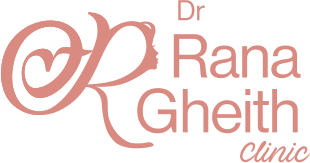Acne Treatment
Acne is one of the most painful skin problems and can be difficult to control, especially when it hides the beauty of the face. Treating acne requires following a skincare routine along with some treatments based on a doctor’s recommendation. Read on to learn more about acne and how to treat it.

Causes of Acne
Acne results from blocked pores or hair follicles with excess oils, bacteria, or dead skin cells. Below are some factors that increase the likelihood of acne:
- Hormonal changes during pregnancy or adolescence, known as hormonal acne.
- Polycystic ovary syndrome (PCOS) and other endocrine disorders.
- Air pollution and certain climate conditions such as high humidity.
- Stress, which increases cortisol or anxiety hormones, playing a role in acne development.
- Frequently touching or trying to pop acne pimples.
- Side effects of certain medications like lithium, some anticonvulsants, and steroids.
- Family history of acne.
- Using skincare products like creams, cleansers, and moisturizers that contain high amounts of oil.
- Lack of sleep.
- Consuming certain foods like those high in sugar and skim milk.
Types of Acne
Here are some types of acne and their signs on the skin:
- Blackheads and Whiteheads
- Papules: Small, red, raised bumps caused by inflamed or infected hair follicles.
- Pustules: Small, red bumps on the skin with pus at their tips.
- Nodules: Large, painful lumps under the skin.
- Cysts: Large, painful lumps under the skin filled with pus.
Acne Treatment
Acne treatment depends on the severity of the symptoms. Below are suitable treatments based on the severity of acne symptoms:
Treating Mild Acne
Mild or simple acne can be treated with over-the-counter products such as cleansers and topical creams containing ingredients like benzoyl peroxide, which helps dry out existing pimples, prevent new ones, and kill acne-causing bacteria, or salicylic acid, which helps exfoliate the skin to prevent clogged pores.
Treating Moderate Acne
If over-the-counter treatments do not work after several weeks, it is advisable to visit a doctor who may prescribe a variety of treatments such as antibiotics like erythromycin or clindamycin, or retinoids like retinol. In some cases, the doctor may recommend an oral antibiotic or hormonal contraceptives to control acne symptoms.
Treating Severe Acne
For severe acne symptoms, the doctor may recommend combining multiple medications such as topical or oral antibiotics and topical retinoids. The doctor may also suggest cosmetic treatments like:
- Chemical Peeling: Removes the upper layers of the skin and is a suitable treatment for mild acne scars.
- Photodynamic Therapy: Uses medications and light or special laser to reduce oil production and bacteria. Other laser treatments can also help improve acne and scars.
- Steroid Injections: Steroids can treat severe acne by injecting them into large nodules to reduce inflammation.
Acne Treatment at Dr. Rana Gheith's Center
At Dr. Rana Tariq Gheith’s Center, we can treat acne using various methods determined by our team based on the severity of the symptoms. We use the latest techniques, which are among the fastest and most effective ways to get rid of acne.

Follow us